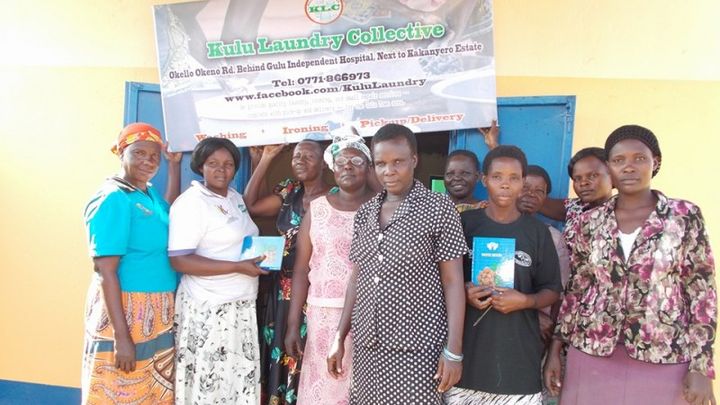
Kulu Laundry Collective
Donation protected
KULU WOMEN'S LAUNDRY COLLECTIVE
Gulu, Uganda
The Goal
The aim of the Kulu Women's Laundry Collective is to provide ten female-headed households in the town of Gulu, Uganda with a sustainable source of income grounded in a local customer base.
As will be detailed below, over the course of two and a half years, the funds from this campaign will be used to supply the start-up materials, training, and initial overhead payments that will ultimately form the foundation of a full-fledged, self-sufficient laundry business.
The word "Kulu" is the Acholi term for a river, brook, or well. Historically, the kulu was the site of a range of daily household work -- including, not surprisingly, laundry. More importantly, though, it served as a community's primary source of water.
Moving forward, the members of the Kulu Women's Laundry Collective hope that their particular "Kulu" will provide them with a site for dignified and empowering employment, while also serving as the wellspring of a sustainable income for the future.
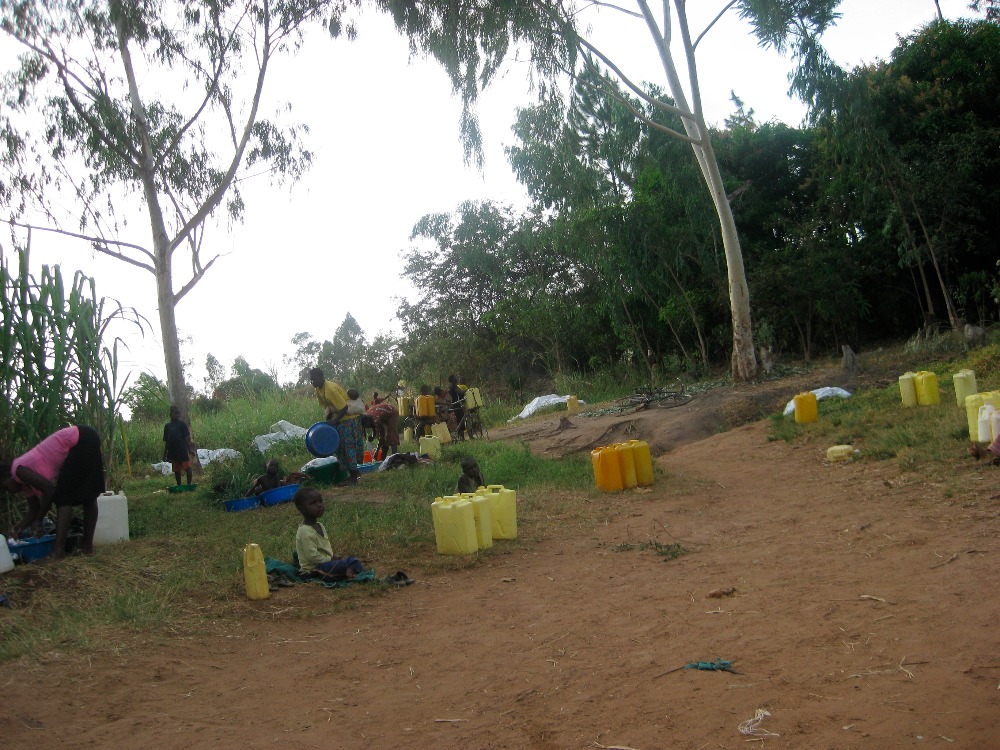 Women collecting water and washing clothes at a kulu near Gulu town.
Women collecting water and washing clothes at a kulu near Gulu town.
The Members
The members of the Kulu Women's Laundry Collective are a group of ten women from the Kasubi neighborhood of the Gulu municipality in northern Uganda. The women are all principal bread-winners for their households, many of them having been widowed as a result of the recent war and concomittant decade of internment in the region.
For several years now, they have cooperated in an informal group-savings initiative in which each of the women contributed a small amount of money to serve as a financial safety net in case any individual member found herself in need of emergency assistance.
All ten women, however, have had trouble securing continuous employment. As a result, in 2014, they began exploring the possibility of starting a business together.
Ultimately, for reasons that will be elaborated below, they agreed to work toward establishing a laundry collective.
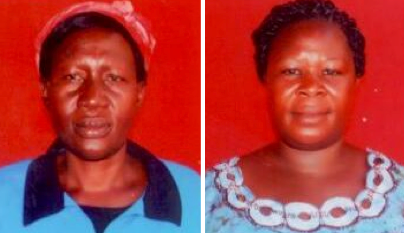 Pictured above are Gladys Laker and Tofi Odoki, two of the group's founding members, who will serve as managers for the Kulu Women's Laundry Collective.
Pictured above are Gladys Laker and Tofi Odoki, two of the group's founding members, who will serve as managers for the Kulu Women's Laundry Collective.
Background
As the origin point of the Lord’s Resistance Army (LRA), the northern Ugandan district of Gulu spent two decades at the heart of the Africa’s longest running conflict. Though the LRA shifted its operations out of Uganda in 2006, recovery has been a slow and delicate process. Civilians and ex-combatants alike have suffered tremendous traumas and physical losses. In addition, the war caused massive social upheaval: because approximately 80% of the local Acholi population spent over ten years forcibly displaced into government camps, the transition back to peacetime life (and livelihood) has proved daunting. In particular, access to land has become a major obstacle to stability in a region where people have historically lived off subsistence farming.
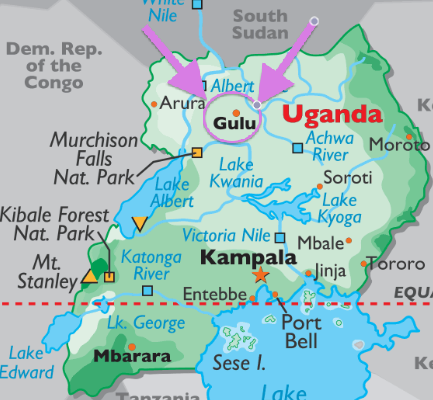
In light of such developments, numerous aid groups now offer vocational training to equip community members with alternative skills for income generation. Some of these initiative prove extremely fruitful. Nevertheless, many income-generating projects of this sort stumble across one of two major pitfalls: they tend toward instruction in the same skill set, and rely too heavily on foreigners (aid workers and volunteers who will eventually leave the region) as a customer base.
This is particularly the case for female benficiaries, a great portion of whom are given instruction in either sewing or craft-making. Though it is possible to make a living as a seamstress in Uganda, the Gulu market is now glutted with tailoring services. Meanwhile, traditional crafts sell well to foreigners, but enjoy little success among the local customer base.
To flourish under current circumstances and succeed in the long term, new income-generating projects must look to attract customers within the local community -- ideally by filling a gap in existing services.
Why Laundry
Laundry, while ironically requiring very little in the way of vocational training, is in fact a service that would fill such a gap. Though a few hotels offer laundry services for customers, and some women will wash small loads at water points for a fee, no one has yet established a dedicated laundry business in Gulu town.
Living with regular access to washing machines, many in the West may forget how time consuming laundry can be without this appliance. In the developing world, the chore often takes up the better part of a day. Some wealthier households may leave the task to a maid, but house help is a luxury most families in Gulu cannot afford. The town has few wealthy inhabitants. What it does have, however, is an fledgling middle class.
Gulu emerged from the LRA conflict an isolated and impoverished town. For many of its residents conditions remain largely unchanged (hence the continued need for intervention). Nevertheless, the past eight years have seen significant development: most of the town’s roads are now paved, numerous shops and restaurants have opened, hotels and inns are often bustling, and Gulu has even become home to a new branch of the Kenyan hypermarket Uchumi. While these locales often cater to foreigners working in the area, it is a sign of the changing economic situation that the clientele in these places is increasingly comprised of locals.
These are generally people with modest salaries who could not afford the cost of a fulltime housekeeper. Many of them, however, do have the disposable income to pay for individual household services such as laundering – were such services offered to be offered in Gulu town....
Services the Kulu Women's Laundry Collective Plans to Offer
The Collective will take orders by phone and collect loads of laundry from customers' homes. The women of the Collective will then wash, dry, and iron all items -- also making small repairs for an extra fee. When loads are complete, they will then be delivered back to customers' homes at an agreed-upon time.
A preliminary pricing table for these services can be seen below. The prices are a function of the labor and supplies required for each task and were arrived at based on an informal poll in which potential customers were asked how much they would be willing to pay for a given service.
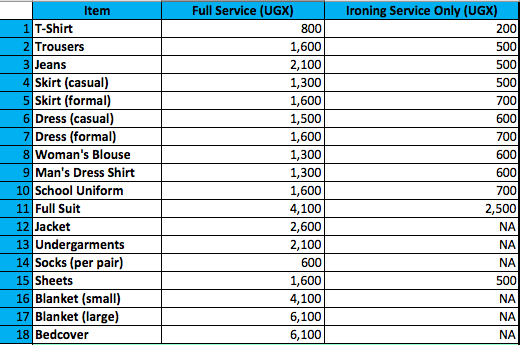
To our knowledge, the Kulu Women's Laundry Collective will be the only business in all of Gulu to offer such comprehensive service to its clientele.
Of course, such an ambitious business project cannot get off the ground without significant capital -- which is where the women of the Collective hope you come in.......
Material Start-Up Costs
($1,461.98)*
As shown below, the material start-up costs for the collective are modest, amounting to around $1,461.89. This sum will cover such items as bicycles for delivery and pickup, irons and ironing boards, jerrycans for water storage, dedicated phones for communication with customers, and a host of other supplies that will allow the Collective to provide their clients with top-knotch service.
This portion of the budget breaks down as follows:
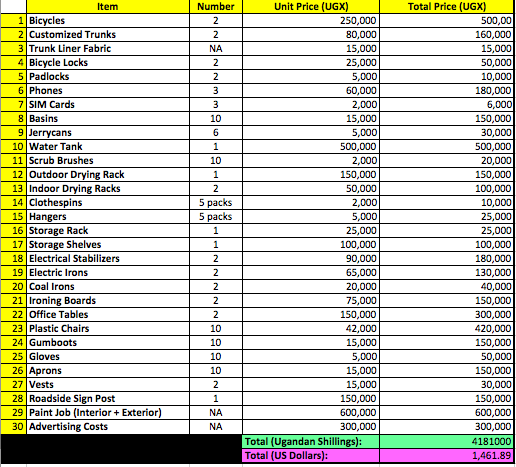
A brief explanation for each item in the start-up inventory can be read below:
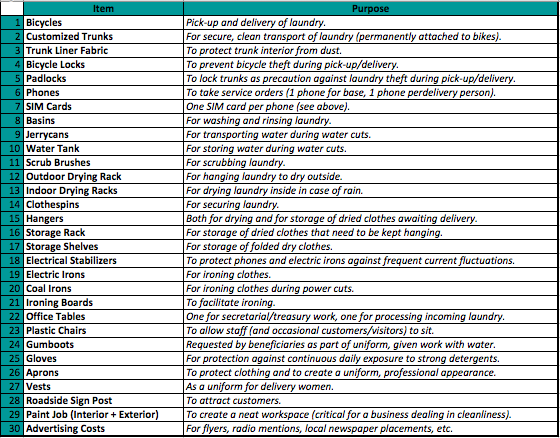
Training
($4,622.72 over 2.5 years)
Training for the employees of the Kulu Women's Laundry Collective will occur in several stages, beginning with a five-day session to help the group finalize plans for their business operation. During this gathering, all the women will undergo brief instruction in washing and ironing, as well as small clothing repairs. The majority of the session, however, will be devoted to tutorials on bookkeeping, business management, and savings practices.
This bout of training, like all further sessions, will be facilitated by Okello Moses Rubangangeyo of the Roman Catholic Archdiocese of Gulu, and Evelyn Akullo of the Justice and Reconciliation Project. Mr. Rubangangeyo has more than a decade of experience working with income-generating projects in the post-conflict setting. Ms. Akullo works in peacebuilding and reconciliation, while also managing her own poultry business and bakery project.
The costs for this initial training session will come to an estimated $1,720.28 as laid out below:

Subsequent trainings will be much shorter, and will serve primarily as a check-in to monitor the progress of the group and address any problems the Collective may be encountering.
A one-day session will be held at the three-month, the six-month, and the nine-month mark of the business's existence.
At the twelve-month mark, the women of the Collective will meet with the training facilitators for two days to conduct a more detailed review of their operation thus far.
After the first year, the Collective and facilitatotrs will meet for a one-day session at the the 18-month mark, and the 24-month mark.
At the 30-month mark, they will convene for a final two day meeting to reflect on the full run of the project. After this point, it is hoped that the Kulu Women's Laundry Collective will be fully self-sufficient.
The budget for the one-day sessions is laid out below:

The budget for the two-day meetings is estimated as follows:

Together, all one- and two- day training meetings are expected to cost around $2,902.44, bringing the total cost of training (including the original five-day session) to $4,622.72 over the course of two and a half years.
Recurring Costs
($10,437.06 over 2.5 years)
The vast majority of the money raised from this campaign will go into covering the first two and a half years of the Collective's recurring costs of business. Based on a preliminary analysis of the potential market, it appears that this is the amount of time the Collective would have to operate before it had saved up enough capital to both cover its own costs and provide its ten members with an income.
After the first two and a half years, the operation is expected to become self-sufficient.
The recurring costs break down as follows:

The items in the recurring cost budget are breifly explained below:
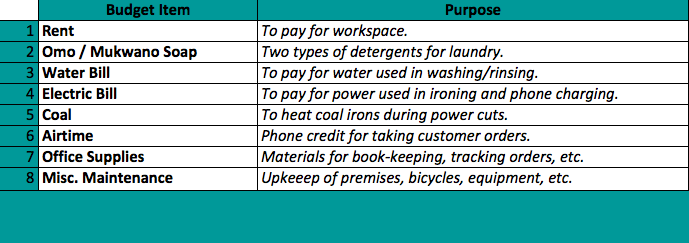
Overview
The estimated costs for getting the Kulu Women's Laundry Collective fully off the ground come to $16,521.67. The campaign goal of $17,500 includes a buffer for exchange rate fluctuations and for the costs of international money transfers.
This sum will allow ten women who have long cooperated to support one another to come together
in a joint business venture and create sustainable source of income for their families.
*All Ugandan Shilling to U.S. Dollar conversions are based on the exchange rate as of February 19, 2015.
Gulu, Uganda
The Goal
The aim of the Kulu Women's Laundry Collective is to provide ten female-headed households in the town of Gulu, Uganda with a sustainable source of income grounded in a local customer base.
As will be detailed below, over the course of two and a half years, the funds from this campaign will be used to supply the start-up materials, training, and initial overhead payments that will ultimately form the foundation of a full-fledged, self-sufficient laundry business.
The word "Kulu" is the Acholi term for a river, brook, or well. Historically, the kulu was the site of a range of daily household work -- including, not surprisingly, laundry. More importantly, though, it served as a community's primary source of water.
Moving forward, the members of the Kulu Women's Laundry Collective hope that their particular "Kulu" will provide them with a site for dignified and empowering employment, while also serving as the wellspring of a sustainable income for the future.
 Women collecting water and washing clothes at a kulu near Gulu town.
Women collecting water and washing clothes at a kulu near Gulu town. The Members
The members of the Kulu Women's Laundry Collective are a group of ten women from the Kasubi neighborhood of the Gulu municipality in northern Uganda. The women are all principal bread-winners for their households, many of them having been widowed as a result of the recent war and concomittant decade of internment in the region.
For several years now, they have cooperated in an informal group-savings initiative in which each of the women contributed a small amount of money to serve as a financial safety net in case any individual member found herself in need of emergency assistance.
All ten women, however, have had trouble securing continuous employment. As a result, in 2014, they began exploring the possibility of starting a business together.
Ultimately, for reasons that will be elaborated below, they agreed to work toward establishing a laundry collective.
 Pictured above are Gladys Laker and Tofi Odoki, two of the group's founding members, who will serve as managers for the Kulu Women's Laundry Collective.
Pictured above are Gladys Laker and Tofi Odoki, two of the group's founding members, who will serve as managers for the Kulu Women's Laundry Collective. Background
As the origin point of the Lord’s Resistance Army (LRA), the northern Ugandan district of Gulu spent two decades at the heart of the Africa’s longest running conflict. Though the LRA shifted its operations out of Uganda in 2006, recovery has been a slow and delicate process. Civilians and ex-combatants alike have suffered tremendous traumas and physical losses. In addition, the war caused massive social upheaval: because approximately 80% of the local Acholi population spent over ten years forcibly displaced into government camps, the transition back to peacetime life (and livelihood) has proved daunting. In particular, access to land has become a major obstacle to stability in a region where people have historically lived off subsistence farming.

In light of such developments, numerous aid groups now offer vocational training to equip community members with alternative skills for income generation. Some of these initiative prove extremely fruitful. Nevertheless, many income-generating projects of this sort stumble across one of two major pitfalls: they tend toward instruction in the same skill set, and rely too heavily on foreigners (aid workers and volunteers who will eventually leave the region) as a customer base.
This is particularly the case for female benficiaries, a great portion of whom are given instruction in either sewing or craft-making. Though it is possible to make a living as a seamstress in Uganda, the Gulu market is now glutted with tailoring services. Meanwhile, traditional crafts sell well to foreigners, but enjoy little success among the local customer base.
To flourish under current circumstances and succeed in the long term, new income-generating projects must look to attract customers within the local community -- ideally by filling a gap in existing services.
Why Laundry
Laundry, while ironically requiring very little in the way of vocational training, is in fact a service that would fill such a gap. Though a few hotels offer laundry services for customers, and some women will wash small loads at water points for a fee, no one has yet established a dedicated laundry business in Gulu town.
Living with regular access to washing machines, many in the West may forget how time consuming laundry can be without this appliance. In the developing world, the chore often takes up the better part of a day. Some wealthier households may leave the task to a maid, but house help is a luxury most families in Gulu cannot afford. The town has few wealthy inhabitants. What it does have, however, is an fledgling middle class.
Gulu emerged from the LRA conflict an isolated and impoverished town. For many of its residents conditions remain largely unchanged (hence the continued need for intervention). Nevertheless, the past eight years have seen significant development: most of the town’s roads are now paved, numerous shops and restaurants have opened, hotels and inns are often bustling, and Gulu has even become home to a new branch of the Kenyan hypermarket Uchumi. While these locales often cater to foreigners working in the area, it is a sign of the changing economic situation that the clientele in these places is increasingly comprised of locals.
These are generally people with modest salaries who could not afford the cost of a fulltime housekeeper. Many of them, however, do have the disposable income to pay for individual household services such as laundering – were such services offered to be offered in Gulu town....
Services the Kulu Women's Laundry Collective Plans to Offer
The Collective will take orders by phone and collect loads of laundry from customers' homes. The women of the Collective will then wash, dry, and iron all items -- also making small repairs for an extra fee. When loads are complete, they will then be delivered back to customers' homes at an agreed-upon time.
A preliminary pricing table for these services can be seen below. The prices are a function of the labor and supplies required for each task and were arrived at based on an informal poll in which potential customers were asked how much they would be willing to pay for a given service.

To our knowledge, the Kulu Women's Laundry Collective will be the only business in all of Gulu to offer such comprehensive service to its clientele.
Of course, such an ambitious business project cannot get off the ground without significant capital -- which is where the women of the Collective hope you come in.......
Material Start-Up Costs
($1,461.98)*
As shown below, the material start-up costs for the collective are modest, amounting to around $1,461.89. This sum will cover such items as bicycles for delivery and pickup, irons and ironing boards, jerrycans for water storage, dedicated phones for communication with customers, and a host of other supplies that will allow the Collective to provide their clients with top-knotch service.
This portion of the budget breaks down as follows:

A brief explanation for each item in the start-up inventory can be read below:

Training
($4,622.72 over 2.5 years)
Training for the employees of the Kulu Women's Laundry Collective will occur in several stages, beginning with a five-day session to help the group finalize plans for their business operation. During this gathering, all the women will undergo brief instruction in washing and ironing, as well as small clothing repairs. The majority of the session, however, will be devoted to tutorials on bookkeeping, business management, and savings practices.
This bout of training, like all further sessions, will be facilitated by Okello Moses Rubangangeyo of the Roman Catholic Archdiocese of Gulu, and Evelyn Akullo of the Justice and Reconciliation Project. Mr. Rubangangeyo has more than a decade of experience working with income-generating projects in the post-conflict setting. Ms. Akullo works in peacebuilding and reconciliation, while also managing her own poultry business and bakery project.
The costs for this initial training session will come to an estimated $1,720.28 as laid out below:

Subsequent trainings will be much shorter, and will serve primarily as a check-in to monitor the progress of the group and address any problems the Collective may be encountering.
A one-day session will be held at the three-month, the six-month, and the nine-month mark of the business's existence.
At the twelve-month mark, the women of the Collective will meet with the training facilitators for two days to conduct a more detailed review of their operation thus far.
After the first year, the Collective and facilitatotrs will meet for a one-day session at the the 18-month mark, and the 24-month mark.
At the 30-month mark, they will convene for a final two day meeting to reflect on the full run of the project. After this point, it is hoped that the Kulu Women's Laundry Collective will be fully self-sufficient.
The budget for the one-day sessions is laid out below:

The budget for the two-day meetings is estimated as follows:

Together, all one- and two- day training meetings are expected to cost around $2,902.44, bringing the total cost of training (including the original five-day session) to $4,622.72 over the course of two and a half years.
Recurring Costs
($10,437.06 over 2.5 years)
The vast majority of the money raised from this campaign will go into covering the first two and a half years of the Collective's recurring costs of business. Based on a preliminary analysis of the potential market, it appears that this is the amount of time the Collective would have to operate before it had saved up enough capital to both cover its own costs and provide its ten members with an income.
After the first two and a half years, the operation is expected to become self-sufficient.
The recurring costs break down as follows:

The items in the recurring cost budget are breifly explained below:

Overview
The estimated costs for getting the Kulu Women's Laundry Collective fully off the ground come to $16,521.67. The campaign goal of $17,500 includes a buffer for exchange rate fluctuations and for the costs of international money transfers.
This sum will allow ten women who have long cooperated to support one another to come together
in a joint business venture and create sustainable source of income for their families.
*All Ugandan Shilling to U.S. Dollar conversions are based on the exchange rate as of February 19, 2015.
Organizer
Sara Weschler
Organizer
Pelham, NY
Inspired to help? Start a fundraiser for someone you know


